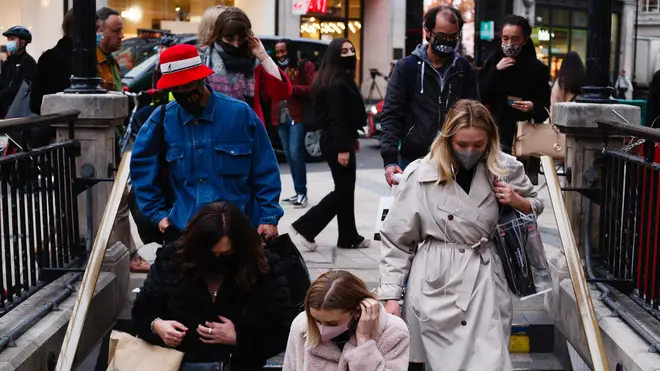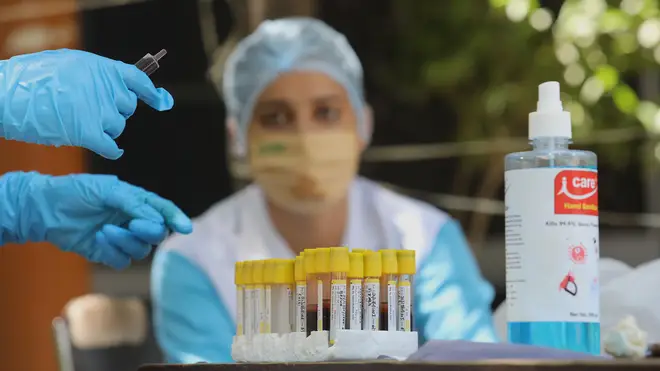
Tom Swarbrick 4pm - 6pm
27 October 2020, 00:01 | Updated: 27 October 2020, 13:40

Covid-19 antibodies may only last for a few months, a fresh study has suggested, sparking fears that resistance to the virus may decline as time goes on.
Figures from Imperial College London showed the number of people with antibodies fell by 26.5 per cent over three months.
According to the Real-Time Assessment of Community Transmission (React-2) study, there is a "variable waning in antibody positivity", meaning a possible decrease in immunity over time after infection and an increased risk of reinfection as the number of antibodies decline.
Experts said the results show a vaccine is needed to protect large numbers of the population, and so-called "herd immunity" is still a "long, long way" off.
Professor Paul Elliott, from Imperial College London, said that a vaccine response "may behave differently to the response to natural infection".
Asked what the implications were for a vaccine and how long protection from a vaccine may last, he said: "I think that's an open question that needs to be kept under close research and close scrutiny over the coming weeks and months.
"It's possible that people might need booster vaccines. For some viruses there's lifelong immunity; for the coronaviruses that doesn't seem to be the case, and we know that the immunity can fluctuate so, yes, this is something that needs to be looked at very carefully."
He said healthcare workers were found to have higher levels of antibodies in the study, as did people living in large households and those from black, Asian and minority ethnic backgrounds.
Read more: Tory MPs demand ‘roadmap out of lockdown’ as Nottingham enters Tier 3
Some 365,104 adults took part in three rounds of testing for the study between late June and September to measure the prevalence of antibody positivity in England.

It found that those aged 18 to 24 had the highest prevalence of antibodies over the study period, which declined at the lowest rate out of all age groups.
People aged 75 and over had the lowest prevalence and the largest decline.
Further data has also found that over 95 per cent of the UK's population is unlikely to have the antibodies needed to protect them from coronavirus.
Read more: Tesco apologises after suggesting sanitary products were 'non-essential' in Wales
Research by Imperial College London estimated just 4.4% of adults had some form of immunity against Covid-19 as cases started to increase again in September.
Health Minister Lord Bethell said: “This study led by Imperial and Ipsos MORI is a critical piece of research, helping us to understand the nature of COVID-19 antibodies over time, and improve our understanding about the virus itself. We rely on this kind of important research to inform our continued response to the disease, so we can continue to take the right action at the right time.

Caller in Cardiff brands lockdown 'sinister'
“It is also important that everyone knows what this means for them – this study will help in our fight against the virus, but testing positive for antibodies does not mean you are immune to COVID-19.
“Regardless of the result of an antibody test, everyone must continue to comply with government guidelines including social distancing, self-isolating and getting a test if you have symptoms and always remember Hands, Face, Space.”
Fresh hope for a vaccine was delivered yesterday after the Oxford vaccine trial said that there was a "strong immune response" amongst the elderly.
The vaccine, produced by Oxford University and AstraZeneca, is considered to be one of the forerunners in the race to find one for virus which is currently ripping its way throughout the world.
Information gleaned from an earlier stage of the trial also suggested a "similar" immune response in younger and older adult as to the elderly.
The vaccine is currently in a phase three clinical trial, which means the safety and effectiveness of the vaccine is being tested by thousands of participants across a number of different countries.